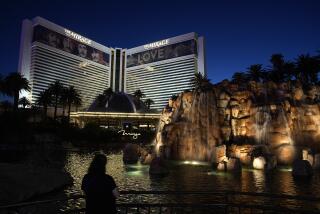On a Roll : Hilton-ITT Deal Could Presage More Gaming Mergers
- Share via
Will the Las Vegas Strip--altered so radically by explosive demolitions, billion-dollar construction plans, neon and glitz--now be even more decisively changed by a corporate takeover?
Gaming industry observers say the proposed takeover of ITT by Hilton Hotels may not lead to any immediate physical changes on the Strip, but may have longer-term significance for the gaming industry as a whole.
Analysts say that with the exception of ITT’s own ambitious plans for a new casino next door to its Sheraton Desert Inn resort on the Strip, few continuing construction projects are likely to be reconsidered because of any change in the competitive balance in town.
However, the deal represents the continuation of a consolidation phase in the gaming industry.
“By the turn of this decade, you’ll be able to count the number of gaming companies dominating this market on the ends of your fingers,” said Marvin B. Roffman of Roffman Miller Associates.
Among the survivors, he predicted, will be Hilton, Mirage Resorts, Circus Circus Enterprises, and MGM Grand--all of which might be on the prowl for acquisitions. Companies at risk of being gobbled up include Harrah’s Entertainment, small regional operators such as Argosy and President, and even such highly leveraged operators such as Donald Trump’s Trump Hotels & Casino Resorts.
“To build a first-class property now takes at least $500 million,” Roffman said. “The smaller companies don’t stand a chance.”
The gaming field’s previous major mergers involved, as it happens, both parties to the latest proposal. In 1995, ITT paid $1.7 billion for Caesars World and then set its sights on Bally Entertainment--only to be outbid last year by Hilton, which paid $3 billion for Bally. Hilton was later said to be on the prowl for another gaming acquisition, although most speculation focused on Circus Circus Enterprises as a possible target.
The latest deal would produce the world’s largest gaming and lodging company. In Las Vegas alone the deal would bring under one management five major properties: the Flamingo Hilton and Las Vegas Hilton; Bally’s Las Vegas Strip resort; the ITT Sheraton Desert Inn; and Caesars Palace.
In Atlantic City, the deal would bring together Bally’s Park Place, the Atlantic City Hilton (a former Bally’s casino) and Caesars Atlantic City.
As for the other players, a Hilton-ITT merger is unlikely to have much impact on current expansions and renovations being undertaken in Las Vegas, Atlantic City and other leading gambling centers.
The other major companies and their current plans are:
* Circus Circus Enterprises, which dominates the low-end and mid-market in Las Vegas via its Circus Circus, Excalibur and Luxor casino resorts. Circus is bidding to become a player in the upper market by opening Project Paradise, a 4,000-room resort on the former site of the Hacienda, in 1998. Paradise is to include a 400-room, five-star Four Seasons Hotel.
* Mirage Resorts, whose Mirage casino is Hilton’s strongest rival in the high-end Vegas market. Mirage plans to again set a standard for luxury casino resorts when it opens its $1.35-billion Bellagio on the former site of the Dunes in 1998.
* MGM Grand, controlled by financier Kirk Kerkorian, is a potent competitor in the mid-scale and upscale markets with its MGM Grand Hotel and its recently launched New York-New York (a joint venture with Primadonna Resorts.) MGM is proposing to spend more than $300 million to expand and renovate its namesake property.
“Those others are all big enough that this isn’t a threat,” said Andrew Kaneb, gaming industry analyst at Deutsche Morgan Grenfell.
Indeed, the biggest immediate impact of the proposed deal will probably be on ITT’s own plans. In a public statement, Hilton said Monday that “a substantial portion” of ITT’s planned $3-billion capital expenditure and expansion program “would be unnecessary” in the aftermath of a merger.
Gambling observers viewed the statement as a signal that Hilton might delay or cancel ITT’s two proposed Planet Hollywood casino resorts, currently slated for construction in Las Vegas next door to the Desert Inn and on the Atlantic City boardwalk four doors north of Bally’s Park Place.
“Certainly the timing of the Planet Hollywood projects may come into question,” said Scott Renner, gaming analyst for Salomon Bros.
“The single biggest issue for us on the gaming side has been the overcapacity in Las Vegas and Atlantic City,” said David Wolfe, gaming analyst for Oppenheimer & Co., referring to record-breaking construction plans in both locales. “Now you don’t need another Planet Hollywood, and that capital can be reallocated back to the shareholders in more beneficial ways.”
ITT’s capital program also includes a $900-million renovation and expansion of Caesars Palace. Because that signature Las Vegas property is widely regarded as desperately in need of such an upgrade, few observers expect the plans to be altered.
Hilton’s proposal to build a Paris-themed casino next to its Bally’s Las Vegas property are also thought to be firm--although analyst Harold Vogel of Cowen & Co. speculated it might give the property a different theme.
“They could build the Planet Hollywood there,” he said. In any event, a combined Hilton-ITT would be a dominating force in Las Vegas. As the owner or manager of 30 casinos and 655 hotels with 230,000 rooms, the company also would benefit from a vast worldwide reservations network.
The presumed synergies of ITT and Hilton might insulate the proposed deal from the encroachment of other bidders, several analyst said. For one thing, most other potential bidders have expertise in either lodging or gaming, not both. Few gaming and lodging companies have Hilton’s ability to wrest significant savings in costs by consolidating operations.
Few, moreover, have the wherewithal on their own to top Hilton’s $10.5-billion bid--although a joint bid by a gaming and lodging company in partnership, say by Marriott and Mirage, might be plausible.
Few see such a partnership emerging, however. “This is truly a unique opportunity for Hilton,” Wolfe said.
(BEGIN TEXT OF INFOBOX / INFOGRAPHIC)
Upping the Ante
Hilton Hotels Corp., seeking to expand its hotel and gaming businesses, offered to buy ITT Corp. for $10.5 billion in cash and debt. Hotel properties were Hilton’s and ITT’s largest revenue generators in 1995, with gaming the second-largest source. Hilton holds the largest casino company in the U.S., based on casino win, or the amount a casino company has left after paying winning bettors.
Hilton Hotels
* Headquarters: Beverly Hills
* Chief executive: Stephen F. Bollenbach
* Employees: 48,000
* Company assets: Owns the Waldorf-Astoria in New York and the Beverly Hilton as part of its hotels chain. Casino interests include the Las Vegas Hilton, the Flamingo Hilton and Bally’s Park Place in Atlantic City, N.J.
* 1995 earnings: $172.8 millionn
Percentage of 1995 revenue of $1.46 billion:
Rooms: 35.6%
Casino: 31.0%
Food & beverage: 16.1%
Other: 17.3%
Hilton stock
Monthly closes and latest:
Monday: $25.25, down 50 cents
ITT
* Headquarters: New York
* Chief executive: Rand V. Araskog
* Employees: 38,000
* Company assets: Owns the Sheraton Hotel chain and Caesars World casinos, as well as half of Madison Square Garden, the New York Knicks and the New York Rangers.
* 1995 earnings: $147.0 million
Percentage of 1995 revenue of $6.35 billion:
Hotels: 64.9%
Gaming: 21.6%
Information services: 13.5%
Note: ITT split itself into three companies--ITT Hartford, ITT Industries and the new ITT Corp.--in June 1995. ITT Corp. retained the company’s hotel, gaming and entertainment interests.
ITT stock
Monthly closes and latest:
Monday: $58.50, up $14.75
Biggest Players
Company / 1995 casino win, in billions:
Hilton/Bally: $1.4
Harrah’s: 1.3
Caesars/ITT: 1.2
Trump: 1.1
Mirage Resorts: 0.8
Circus Circus: 0.8
Boyd Group: 0.5
Hollywood Casinos: 0.5
Aztar: 0.5
MGM Grand: 0.4
Sources: Bloomberg News, company reports, Sutro & Co. Researched by JENNIFER OLDHAM / Los Angeles Times
More to Read
Inside the business of entertainment
The Wide Shot brings you news, analysis and insights on everything from streaming wars to production — and what it all means for the future.
You may occasionally receive promotional content from the Los Angeles Times.










